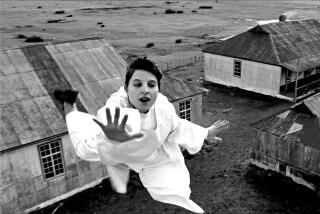Chile’s Watershed
- Share via
Chile’s 12 million citizens can well face 1988 with uneasiness. The country will decide next year whether to continue the dictator-president, Gen. Augusto Pinochet Ugarte, for another eight years in office. He has ruled the country with a heavy hand in the 14 years since the military forces overthrew President Salvador Allende Gossens in a bloody coup.
To say the country will decide is of course a simplification. First the ruling military junta must decide whether it wants Pinochet to be a candidate; that decision is not wholly foregone. Then the people must decide by plebiscite whether to approve him. That decision is not foregone either, but Pinochet is doing everything in his considerable power to assure the stamp of approval from both his military colleagues and the voters.
Looking at the political situation, the U.S. State Department said last week in a firm statement, said to be approved by President Reagan, that Chile is “at a watershed.” Meaning that time is running out for the government of Chile to put a truly liberal face on its promised slow return to democracy. The scheduled plebiscite on Pinochet is expected in September. In the meantime the newly approved opposition political parties have been sorely hampered in their efforts either to urge a no vote for Pinochet or, as some of them would like, to promote a change in the rules to permit a contested election.
As the State Department aptly said, “For the ideal of popular sovereignty to become a reality in Chile, the United States believes that a climate of freedom and fair competition must be established many months before the actual balloting takes place.”
The department dryly listed a number of desirable conditions, all of which are conspicuous by their absence now: “This atmosphere would be marked by easy and equitable access to mass media, especially television, by unrestricted discussion of political issues, broad freedom of assembly, early announcement of the rules of any electoral proceeding, facilitation of registration by prospective voters, and freedom for citizens and political groups to campaign peacefully in favor of their ideas.”
Last week the United States tried, and failed, to get a sizable block of the Western democracies to make a $250-million World Bank loan to Chile contingent on progress toward these goals. World Bank loans are supposed to be made on an economic basis only; Latin American nations quite reasonably object to political interference of any sort, and in any case Chile easily qualified for the bank’s terms, for in recent years it has done an admirable job of increasing export earnings, of paying its relatively large external debt and, by many accounts, of easing the suffering of at least some of its poor.
But progress toward the politically balanced democracy of the pre-Allende years is dishearteningly slow for Chilean democrats and their supporters abroad. A substantial number of Chileans, if less than a majority, appear to support or at least tolerate Pinochet. For them, scarred by the political and economic turmoil of Allende’s administration, he offers economic growth and stability even as he regularly denounces some democratic opponents as “Marxists,” presides over threats and intimidation to human-rights workers and continues to torture selected alleged “troublemakers,” many of them from the urban poor.
The legal opposition, from the center-right to the moderate left, is confused and divided. The much smaller terrorist left both confuses the democratic opposition and provides Pinochet an excellent foil against which to play his claim to be a defender of “Christian Western civilization” against Marxist-Leninism.
In such a climate interested outsiders, from both the United States and Western Europe, don’t have much leverage, and those Chileans who would prefer democracy, whom all polls call a majority, are left to suffer, and to wanly hope, pretty much on their own.
More to Read
Sign up for Essential California
The most important California stories and recommendations in your inbox every morning.
You may occasionally receive promotional content from the Los Angeles Times.










